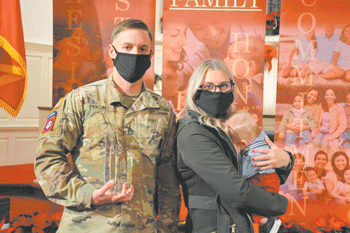 Sgt. 1st Class Justin and Tawni Dixon were named the 2020 Family of the Year for Fort Bragg in a ceremony at the Main Post Chapel Dec. 2.
Sgt. 1st Class Justin and Tawni Dixon were named the 2020 Family of the Year for Fort Bragg in a ceremony at the Main Post Chapel Dec. 2.
The award was presented by Lt. Gen. Michael “Erik” Kurilla, Commanding General of the 18th Airborne Corps and Fort Bragg. Following the ceremony, Kurilla and the Dixon family officially kicked off the holiday season by flipping the switch to light up the 20-foot Fraser fir Christmas tree at the Main Post Parade Field.
The Family of the Year award recognizes the contributions and sacrifices made by military families. The award is in its 18th year.
“Tawni and Sgt. 1st Class Dixon’s work with our families and single soldiers during the no-notice deployment in January and throughout the COVID pandemic has been so crucial during a very stressful period,” Kurilla said. “This kind of personal engagement is going to pay enormous dividends for our families in the coming months.”
Sgt. 1st Class Dixon and his wife were nominated by their unit’s chain of command along with 28 other families across Fort Bragg.
“Both Sgt. 1st Class Dixon and his wife, Tawni, have been instrumental in the success of 3-319 AFAR over the past two years,” said Lt. Col. Benjamin Shepherd, 3rd Battalion, 319th Airborne Field Artillery Regiment commander.
Sgt. 1st Class Dixon served as the battalion’s digital master gunner and operations sergeant while Tawni served as the Soldier and Family Readiness Group leader for Headquarters Battery during the no-notice deployment on New Year’s Eve, supporting over 270 paratroopers and their families.
“I am incredibly thankful for the sacrifices their family has made, and I’m proud to see them receive this honor,” Shepherd said.
Sgt. 1st Class Dixon was recognized for volunteering over 350 hours in the development of a program for wounded warriors. Dixon leads fishing expeditions for veterans with injuries and PTSD. Dixon makes contact with the veterans, takes them to the lake to go fishing. Many veterans will exchange stories and share their experiences which often proves therapeutic for them, Dixon said.
“I volunteer my time and take them out on the water and it’s a stress relief thing for many,” Dixon said.
Veterans interested in learning more can contact the main organization ‘Operation North Star’ on Facebook. There are also a couple of other groups — ‘Airborne Fishing Vets’ and ‘Fishing Buddies for Veterans.’
The project started a year and half ago when Dixon participated in Warriors on the Water, a fishing tournament held twice a year, with active duty and veterans.
“I thought this is really great and I saw the positive impact it had on the vets that participated and thought why don't we just do it all year round instead of twice a year, I have the means to do it and we’ve been blessed so I kind of wanted to give back,” he said. “There’s no reason not to do it if I'm available.”
Dixon has received a donation of fishing supplies so that the veterans he takes out don't have to worry about purchasing bait or fishing poles.
Tawni Dixon was recognized for her role as the SFRG leader, maintaining dialogue between the battalion and the SFRG advisors, and in preparation for the battalion's return, she helped build care packages for redeploying single paratroopers.
In this effort, the battalion FRG collected over $7,000 in sundry items, linens, hygiene items and snacks to ensure their returning soldiers residing in the barracks came home to a care package.
Her most recent participation was a canned food drive with three battalions and one local apartment complex that resulted in the collection of 1,683 canned goods that were donated to the Armed Services YMCA — a resource on Fort Bragg.
“All of our Fort Bragg families are special, but this one was chosen based on their command nomination for not only the leadership and resilience they demonstrate in their day-to-day lives, but also their commitment to family,” said Catherine Mansfield, Family of the Year coordinator with Army Community Service. “It’s a great honor to be named the Fort Bragg Family of the Year, and we are thrilled to have the Dixons as this year’s winner. They represent the true spirit of our military families.”
The FOY award started in 2003 as the culmination of Military Family Month, a designation made by the President in 1996 to recognize the commitment, dedication and sacrifices made by military families.
Mansfield emphasized the importance of this annual event and said having worked in Family Programs for the Army for 30-plus years, she has seen first-hand the sacrifices military families make and how they exhibit undeniable strength and resilience, and this event recognizes that.
Dixon said receiving the award was incredibly shocking and humbling for him because of how many other worthy families are on Fort Bragg who volunteer and give back as well.
“Just to even be nominated and to win in general and we certainly didn't do this all by ourselves, it’s an incredible team effort,” the Dixons said. “We just kind of feel humble to be recognized and we represent all of the families together in receiving this award.”
Pictured above: Sgt. 1st Class Justin and Tawni Dixon were named Fort Bragg's Family of the Year. The Dixon's were recognized by the 18th Airborne Corps and Fort Bragg Commanding General Lt. Gen. Michael Kurilla in a ceremony Dec. 2. (Top photo by Audra Satterlee, Army Community Services. Bottom photo courtesy Dixon family.)
